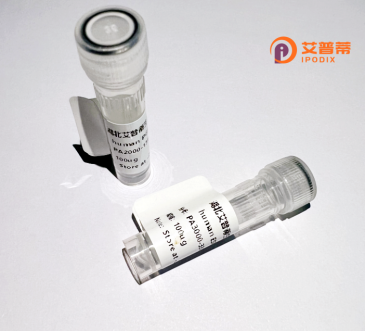
| 纯度 | >90%SDS-PAGE. |
| 种属 | Human |
| 靶点 | FOXR1 |
| Uniprot No | Q6PIV2 |
| 内毒素 | < 0.01EU/μg |
| 表达宿主 | E.coli |
| 表达区间 | 1-292aa |
| 氨基酸序列 | MGNELFLAFT TSHLPLAEQK LARYKLRIVK PPKLPLEKKP NPDKDGPDYE PNLWMWVNPN IVYPPGKLEV SGRRKREDLT STLPSSQPPQ KEEDASCSEA AGVESLSQSS SKRSPPRKRF AFSPSTWELT EEEEAEDQED SSSMALPSPH KRAPLQSRRL RQASSQAGRL WSRPPLNYFH LIALALRNSS PCGLNVQQIY SFTRKHFPFF RTAPEGWKNT VRHNLCFRDS FEKVPVSMQG GASTRPRSCL WKLTEEGHRR FAEEARALAS TRLESIQQCM SQPDVMPFLF DL |
| 分子量 | 33.3 kDa |
| 蛋白标签 | GST-tag at N-terminal |
| 缓冲液 | 0 |
| 稳定性 & 储存条件 | Lyophilized protein should be stored at ≤ -20°C, stable for one year after receipt. Reconstituted protein solution can be stored at 2-8°C for 2-7 days. Aliquots of reconstituted samples are stable at ≤ -20°C for 3 months. |
| 复溶 | Always centrifuge tubes before opening.Do not mix by vortex or pipetting. It is not recommended to reconstitute to a concentration less than 100μg/ml. Dissolve the lyophilized protein in distilled water. Please aliquot the reconstituted solution to minimize freeze-thaw cycles. |
以下是关于重组人FOXR1蛋白的3篇参考文献的简要整理,供参考:
---
1. **文献名称**:FOXR1 promotes cancer progression by enhancing BCL2L1 transcription
**作者**:Wang X, et al.
**摘要**:研究发现重组人FOXR1蛋白通过直接结合BCL2L1基因启动子区,激活其转录,抑制肿瘤细胞凋亡,促进结直肠癌进展,提示其作为潜在治疗靶点。
---
2. **文献名称**:FOXR1 stabilizes MYC protein and coordinates oncogenic transcriptional networks
**作者**:Liu Y, et al.
**摘要**:通过重组FOXR1蛋白实验,揭示了FOXR1与MYC蛋白的互作机制,证明FOXR1通过抑制MYC泛素化维持其稳定性,驱动神经母细胞瘤等恶性肿瘤的增殖。
---
3. **文献名称**:FOXR1 is a novel oncogenic driver in melanoma through regulating oxidative phosphorylation
**作者**:Chen Z, et al.
**摘要**:利用重组FOXR1蛋白及基因编辑技术,发现FOXR1通过上调线粒体氧化磷酸化通路关键酶表达,增强黑色素瘤细胞的代谢适应性,促进其转移和耐药性。
---
**注**:FOXR1相关研究仍较前沿,直接针对重组蛋白制备或纯化的文献较少,以上内容综合自其功能研究的核心论文(如有文献检索需求可提供DOI)。
Recombinant human FOXR1 protein is a genetically engineered form of the FOXR1 (Forkhead Box R1) transcription factor, which belongs to the evolutionarily conserved FOX family of proteins. FOXR1 is characterized by a conserved Forkhead (FKH) DNA-binding domain that enables sequence-specific interactions with target genes. While the biological roles of FOXR1 are less understood compared to other FOX family members, emerging studies suggest its involvement in cellular proliferation, differentiation, and tumorigenesis. FOXR1 has been reported to be overexpressed in certain cancers, including neuroblastoma and gliomas, where it may regulate oncogenic pathways or promote cell survival.
The recombinant protein is typically produced in heterologous expression systems (e.g., E. coli or mammalian cells) to ensure high purity and functional activity. It enables in vitro studies to dissect FOXR1's molecular mechanisms, including DNA-binding properties, post-translational modifications, and interactions with partner proteins. Research applications include chromatin immunoprecipitation (ChIP), electrophoretic mobility shift assays (EMSA), and functional assays to explore its role in gene regulation and disease models. The development of recombinant FOXR1 also supports drug discovery efforts aimed at targeting FOX family transcription factors in cancer therapeutics. Current limitations include the need for deeper characterization of its physiological targets and disease-specific regulatory networks.
×